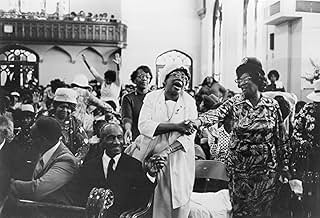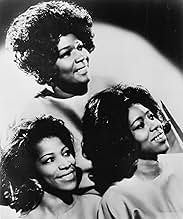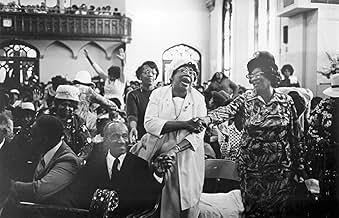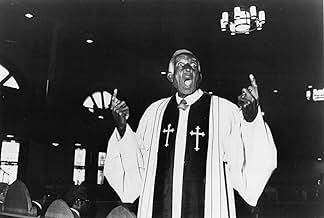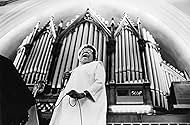Füge eine Handlung in deiner Sprache hinzuDocumentary about the American gospel music scene, focusing on two of the movement's pioneering forces, Thomas A. Dorsey and Willie May Ford Smith.Documentary about the American gospel music scene, focusing on two of the movement's pioneering forces, Thomas A. Dorsey and Willie May Ford Smith.Documentary about the American gospel music scene, focusing on two of the movement's pioneering forces, Thomas A. Dorsey and Willie May Ford Smith.
- Auszeichnungen
- 1 Gewinn & 1 Nominierung insgesamt
Willie Mae Ford Smith
- Self
- (as Willie May Ford Smith)
Billie Barrett GreenBey
- Self
- (as Billie Greenbey)
Rodessa Barrett Porter
- Self
- (as Rhodessa Porter)
Frank Campbell
- Self
- (as Rev. Frank W. Campbell)
Melvin Smotherson
- Self
- (as Rev. Melvin Smotherson)
Empfohlene Bewertungen
My review was written in October 1982 after a New York Film Festival screening.
"Say Amen, Somebody" is a superb documentary feature about the key progenitors of gospel music. Directed by George T. Nierenberg and his team of collaborators have fashioned a model of emotional communications in the non-fiction feature realm, deserving of the widest possible exposure in all media.
In contradistinction to 20th Century Fox''s "Gospel", a well-regarded performance film also headed for the marketplace, "Say Amen" emphasizes the people who sing (and live) the gospel, with the music itself featured amidst footage of their home life and recollections.
Two towering figures are at the film's core: "Mother" Willie Mae Ford Smith (with her family) and Thomas A. Dorsey. Both were instrumental five decades or so ago in bringing the rhythmic "ragtime" form of secular music called gospel into the spiritual church environment, over the resistance of religious figures. Important for the film, both are natural spellbinders in conversation (and in song), communicating colloquially to the camera with an uncanny mixture of humor and emotional fervor.
Nierenberg minimizes his reliance upon still photos and vintage footage, including a performance of the late Mahalia Jackson for historical purposes. Dorsey expounds on the tough early days of his music, his career as a popular blues singer and his writing of standard gospel songs. In a delightful scene, he is upstaged by Smith and his 87-year-old singer/accompanist Sallie Martin, as the women argue over whether the first gospel choir convention originated in Chicago or St. Louis.
Also revealing and moving are scenes of Smith and her family, recalling the old days and pointing up the deep religious faith of gospel practitioners. Despite the proselytizing of the lyrics, the film does not make a sales pitch but wisely stresses the emotional content over the religious.
Performance footage in churches and at a convention spotlights Dorsey, Smith and especially two younger groups. The Barrett Sisters deliver upper-register close harmonies. Sure to rouse any audience, while the O'Neal twin brothers display a rhythmic style closer to popular music (and discuss in bull sessions the need to "come down the middle" to reach the younger people with their music).
Nierenberg has enough coverage (using a 22:1 shooting ratio) to not only keep the film free of filler but to create pointed inserts to listeners with separate sound sources to match. This expertly underlines the basic call-and-response nature of the music, and the viewer of the film is engaged actively in the proceedings by use of surrogate, on-screen interplay. For example, whether listening to a song or a speaker, Mother Smith invariably will interject a pointed comment or verbal endorsement, with her uncanny timing matched by a camera and mic there to record it. Film's title comes from this responsiveness, as Dorsey in the midst of one of his passionate monologues declares: "Say amen, somebody" to the silent film crew. Despite this call, Nierenberg wisely lets his subjects do the talking, fulfilling his role as chronicler and organizer.
Among the top-notch technical credits, editor Fred Barnes deserves singling out for brilliant execution of the director's concepts. Particularly good is a perfectly-matched cut from Mother Smith privately chanting Dorsey's lyric: "Remember me, not just for me but for the work I've done" to her continuing the song in church as the picture's stirring finale. Still awaiting a pickup deal for domestic release, "Say Amen" should sustain a blowup to 35mm and is a clear frontrunner for Academy Award consideration as best documentary.
"Say Amen, Somebody" is a superb documentary feature about the key progenitors of gospel music. Directed by George T. Nierenberg and his team of collaborators have fashioned a model of emotional communications in the non-fiction feature realm, deserving of the widest possible exposure in all media.
In contradistinction to 20th Century Fox''s "Gospel", a well-regarded performance film also headed for the marketplace, "Say Amen" emphasizes the people who sing (and live) the gospel, with the music itself featured amidst footage of their home life and recollections.
Two towering figures are at the film's core: "Mother" Willie Mae Ford Smith (with her family) and Thomas A. Dorsey. Both were instrumental five decades or so ago in bringing the rhythmic "ragtime" form of secular music called gospel into the spiritual church environment, over the resistance of religious figures. Important for the film, both are natural spellbinders in conversation (and in song), communicating colloquially to the camera with an uncanny mixture of humor and emotional fervor.
Nierenberg minimizes his reliance upon still photos and vintage footage, including a performance of the late Mahalia Jackson for historical purposes. Dorsey expounds on the tough early days of his music, his career as a popular blues singer and his writing of standard gospel songs. In a delightful scene, he is upstaged by Smith and his 87-year-old singer/accompanist Sallie Martin, as the women argue over whether the first gospel choir convention originated in Chicago or St. Louis.
Also revealing and moving are scenes of Smith and her family, recalling the old days and pointing up the deep religious faith of gospel practitioners. Despite the proselytizing of the lyrics, the film does not make a sales pitch but wisely stresses the emotional content over the religious.
Performance footage in churches and at a convention spotlights Dorsey, Smith and especially two younger groups. The Barrett Sisters deliver upper-register close harmonies. Sure to rouse any audience, while the O'Neal twin brothers display a rhythmic style closer to popular music (and discuss in bull sessions the need to "come down the middle" to reach the younger people with their music).
Nierenberg has enough coverage (using a 22:1 shooting ratio) to not only keep the film free of filler but to create pointed inserts to listeners with separate sound sources to match. This expertly underlines the basic call-and-response nature of the music, and the viewer of the film is engaged actively in the proceedings by use of surrogate, on-screen interplay. For example, whether listening to a song or a speaker, Mother Smith invariably will interject a pointed comment or verbal endorsement, with her uncanny timing matched by a camera and mic there to record it. Film's title comes from this responsiveness, as Dorsey in the midst of one of his passionate monologues declares: "Say amen, somebody" to the silent film crew. Despite this call, Nierenberg wisely lets his subjects do the talking, fulfilling his role as chronicler and organizer.
Among the top-notch technical credits, editor Fred Barnes deserves singling out for brilliant execution of the director's concepts. Particularly good is a perfectly-matched cut from Mother Smith privately chanting Dorsey's lyric: "Remember me, not just for me but for the work I've done" to her continuing the song in church as the picture's stirring finale. Still awaiting a pickup deal for domestic release, "Say Amen" should sustain a blowup to 35mm and is a clear frontrunner for Academy Award consideration as best documentary.
March 30, 1983 "Say Amen, Somebody" Four stars
Movies / Roger Ebert "Say Amen, Somebody" is the most joyful movie I've seen in a very long time. It is also one of the best musicals and one of the most interesting documentaries. And it's also a terrific good time. The movie is about gospel music, and it's filled with gospel music. It's sung by some of the pioneers of modern gospel, who are now in their 70s and 80s, and it's sung by some of the rising younger stars, and it's sung by choirs of kids. It's sung in churches and around the dining room table; with orchestras and a capella; by an old man named Thomas A. Dorsey in front of thousands of people, and by Dorsey standing all by himself in his own backyard. The music in "Say Amen, Somebody" is as exciting and uplifting as any music I've ever heard on film. The people in this movie are something, too. The filmmaker, a young New Yorker named George T. Nierenberg, starts by introducing us to two pioneers of modern gospel: Mother Willie May Ford Smith, who is 79, and Professor Dorsey, who is 83. She was one of the first gospel soloists; he is known as the Father of Gospel Music. The film opens at tributes to the two of them - Mother Smith in a St. Louis church, Dorsey at a Houston convention - and then Nierenberg cuts back and forth between their memories, their families, their music and the music sung in tribute to them by younger performers. That keeps the movie from seeming too much like the wrong kind of documentary - the kind that feels like an educational film and is filled with boring lists of dates and places. "Say Amen, Somebody" never stops moving, and even the dates and places are open to controversy (there's a hilarious sequence in which Dorsey and Mother Smith disagree very pointedly over exactly which of them convened the first gospel convention). What's amazing in all of the musical sequences is the quality of the sound. A lot of documentaries use "available sound," picked up by microphones more appropriate for the television news. This movie's concerts are miked by up to eight microphones, and the Dolby system is used to produce full stereo sound that really rocks the theater. One of the phenomenons during screenings of this film is the tendency of the audience to get into the act. Willie May Ford Smith comes across in this movie as an extraordinary woman, spiritual, filled with love and power. Dorsey and his longtime business manager, Sallie Martin, come across at first as a little crusty, but then there's a remarkable scene where they sing along, softly, with one of Dorsey's old records. By the end of the film, when the ailing Dorsey insists on walking under his own steam to the front of the gospel convention in Houston, and leading the delegates in a hymn, we have come to see his strength and humanity. Just in case Smith and Dorsey seem too noble, the film uses a lot of mighty soul music as counterpoint, particularly in the scenes shot during a tribute to Mother Smith at a St. Louis Baptist church. We see Delois Barrett Campbell and the Barrett Sisters, a Chicago-based trio who have enormous musical energy; the O'Neal Twins, Edward and Edgar, whose "Jesus Dropped the Charges" is a show-stopper; Zella Jackson Price, a younger singer who turns to Mother Smith for advice; the Interfaith Choir, and lots of other singers. "Say Amen, Somebody" is the kind of movie that isn't made very often, because it takes an unusual combination of skills. The filmmaker has to be able to identify and find his subjects, win their confidence, follow them around, and then also find the technical skill to really capture what makes them special. Nierenberg's achievement here is a masterpiece of research, diligence and direction. But his work would be meaningless if the movie didn't convey the spirit of the people in it, and "Say Amen, Somebody" does that with great and mighty joy. This is a great experience.
Movies / Roger Ebert "Say Amen, Somebody" is the most joyful movie I've seen in a very long time. It is also one of the best musicals and one of the most interesting documentaries. And it's also a terrific good time. The movie is about gospel music, and it's filled with gospel music. It's sung by some of the pioneers of modern gospel, who are now in their 70s and 80s, and it's sung by some of the rising younger stars, and it's sung by choirs of kids. It's sung in churches and around the dining room table; with orchestras and a capella; by an old man named Thomas A. Dorsey in front of thousands of people, and by Dorsey standing all by himself in his own backyard. The music in "Say Amen, Somebody" is as exciting and uplifting as any music I've ever heard on film. The people in this movie are something, too. The filmmaker, a young New Yorker named George T. Nierenberg, starts by introducing us to two pioneers of modern gospel: Mother Willie May Ford Smith, who is 79, and Professor Dorsey, who is 83. She was one of the first gospel soloists; he is known as the Father of Gospel Music. The film opens at tributes to the two of them - Mother Smith in a St. Louis church, Dorsey at a Houston convention - and then Nierenberg cuts back and forth between their memories, their families, their music and the music sung in tribute to them by younger performers. That keeps the movie from seeming too much like the wrong kind of documentary - the kind that feels like an educational film and is filled with boring lists of dates and places. "Say Amen, Somebody" never stops moving, and even the dates and places are open to controversy (there's a hilarious sequence in which Dorsey and Mother Smith disagree very pointedly over exactly which of them convened the first gospel convention). What's amazing in all of the musical sequences is the quality of the sound. A lot of documentaries use "available sound," picked up by microphones more appropriate for the television news. This movie's concerts are miked by up to eight microphones, and the Dolby system is used to produce full stereo sound that really rocks the theater. One of the phenomenons during screenings of this film is the tendency of the audience to get into the act. Willie May Ford Smith comes across in this movie as an extraordinary woman, spiritual, filled with love and power. Dorsey and his longtime business manager, Sallie Martin, come across at first as a little crusty, but then there's a remarkable scene where they sing along, softly, with one of Dorsey's old records. By the end of the film, when the ailing Dorsey insists on walking under his own steam to the front of the gospel convention in Houston, and leading the delegates in a hymn, we have come to see his strength and humanity. Just in case Smith and Dorsey seem too noble, the film uses a lot of mighty soul music as counterpoint, particularly in the scenes shot during a tribute to Mother Smith at a St. Louis Baptist church. We see Delois Barrett Campbell and the Barrett Sisters, a Chicago-based trio who have enormous musical energy; the O'Neal Twins, Edward and Edgar, whose "Jesus Dropped the Charges" is a show-stopper; Zella Jackson Price, a younger singer who turns to Mother Smith for advice; the Interfaith Choir, and lots of other singers. "Say Amen, Somebody" is the kind of movie that isn't made very often, because it takes an unusual combination of skills. The filmmaker has to be able to identify and find his subjects, win their confidence, follow them around, and then also find the technical skill to really capture what makes them special. Nierenberg's achievement here is a masterpiece of research, diligence and direction. But his work would be meaningless if the movie didn't convey the spirit of the people in it, and "Say Amen, Somebody" does that with great and mighty joy. This is a great experience.
Documentaries really don't get much better than this. It's a look behind the scenes at a world few (particularly white) viewers get to see unless it appears on a religious TV show if you like in a town with a black population. We see the lives and performances of two gospel greats, Willie May Ford Smith and Thomas Dorsey. The documentary follows their lives from the early days and leads up to a big conference when the two dynamic subjects share an auditorium. The documentary shows the joy of gospel music in an age of cynicism. We feel the purity of expression here and see very little of the commercial trappings we see in so much of organized religion. People are singing because it feels good! People are responding to these singers because it feels good! People are saying amen because it feels good! Recommended as an antidote to the blahs.
I'm shocked at how few people have seen this film and voted on it. I agree completely with Leonard Maltin's 4-star summary. It's not only a documentary on the lives of two of gospel's founders, Willie Mae Ford Smith and Thomas Dorsey, but it follows them and their families, along with other gospel singers, in the present day.
In some ways, it reminds me of HOOP DREAMS. In one scene, Zella Jackson Price is feeling insecure, talking over serious family issues in the kitchen. And then she's in church, belting out "I'm happy just to know that I'm His child", one of the most powerful, and moving gospel renditions I've heard. And I'm not religious.
As I write this, 2500 people have voted for HOWARD THE DUCK, only 10 for SAY AMEN, SOMEBODY. Something's definitely wrong here.
In some ways, it reminds me of HOOP DREAMS. In one scene, Zella Jackson Price is feeling insecure, talking over serious family issues in the kitchen. And then she's in church, belting out "I'm happy just to know that I'm His child", one of the most powerful, and moving gospel renditions I've heard. And I'm not religious.
As I write this, 2500 people have voted for HOWARD THE DUCK, only 10 for SAY AMEN, SOMEBODY. Something's definitely wrong here.
Features outstanding performances by Willie May Ford Smith, Thomas A. Dorsey, Sallie Martin, the Barrett Sisters, Edward and Edgar O'Neal and Zella Jackson Price. For anyone interested in real Gospel and not some choreographed Hollywood version, look no further.
This film is simply a celebration of Gospel music as sung by child choirs, as sung by its youngest rising stars and its oldest pioneers, as sung in churches and in kitchens, with musical accompaniment as well as a capella. The careers of Willie May Ford Smith and Thomas Dorsey provide background to explore the development of Gospel through the 20th Century.
We are so lucky to have this record of Thomas A. Dorsey (July 1, 1899 - January 23, 1993) on film. It shows the Father of Gospel Music to be a commanding choir director even at 83 years of age.
A sincere, exuberant experience.
This film is simply a celebration of Gospel music as sung by child choirs, as sung by its youngest rising stars and its oldest pioneers, as sung in churches and in kitchens, with musical accompaniment as well as a capella. The careers of Willie May Ford Smith and Thomas Dorsey provide background to explore the development of Gospel through the 20th Century.
We are so lucky to have this record of Thomas A. Dorsey (July 1, 1899 - January 23, 1993) on film. It shows the Father of Gospel Music to be a commanding choir director even at 83 years of age.
A sincere, exuberant experience.
Wusstest du schon
- WissenswertesFilm Critic Roger Ebert listed this as the 8th best film of 1983.
- VerbindungenFeatured in Siskel & Ebert & the Movies: Crix Pick Prez Flix (1993)
Top-Auswahl
Melde dich zum Bewerten an und greife auf die Watchlist für personalisierte Empfehlungen zu.
Details
Box Office
- Bruttoertrag in den USA und Kanada
- 1.108.299 $
- Weltweiter Bruttoertrag
- 1.108.299 $
Zu dieser Seite beitragen
Bearbeitung vorschlagen oder fehlenden Inhalt hinzufügen

